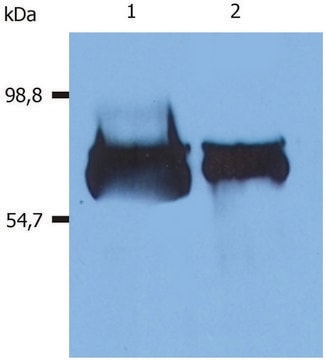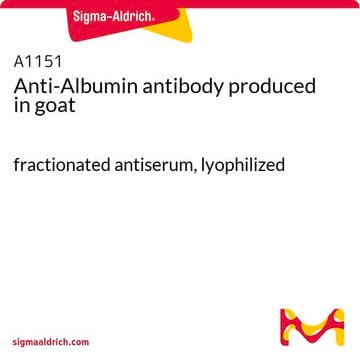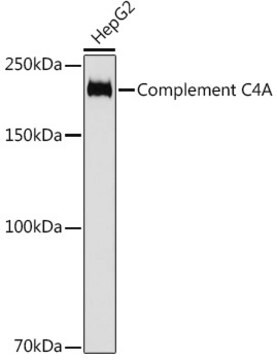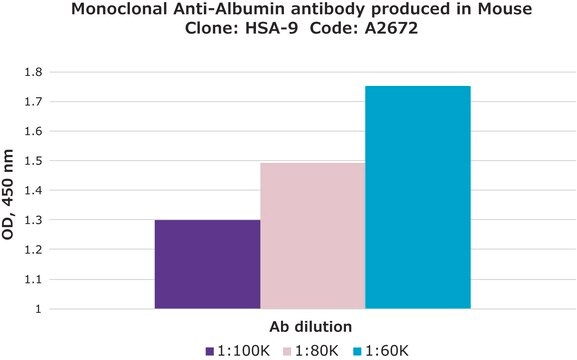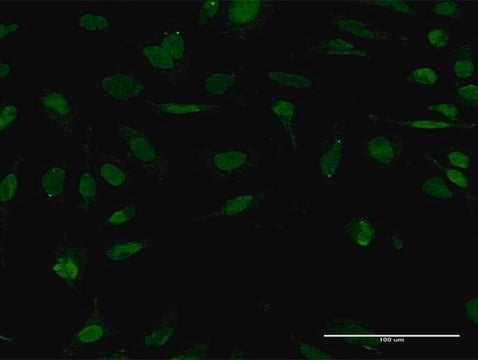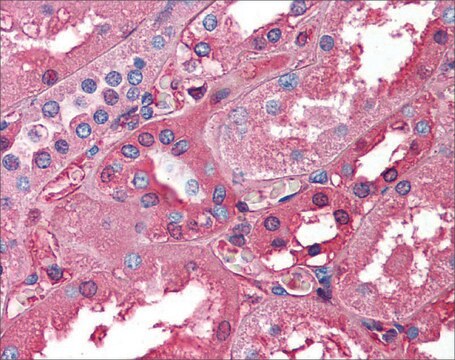SAB4200711
Anti-Human Serum Albumin antibody, Mouse monoclonal
clone HSA-11, purified from hybridoma cell culture
Synonyme(s) :
ALB
About This Item
Produits recommandés
Source biologique
mouse
Niveau de qualité
Forme d'anticorps
purified from hybridoma cell culture
Type de produit anticorps
primary antibodies
Clone
HSA-11, monoclonal
Forme
buffered aqueous solution
Poids mol.
~70 kDa
Espèces réactives
gibbon, monkey, baboon
Concentration
~1.0 mg/mL
Technique(s)
immunoblotting: 2.5-5 ng/mL using human serum
immunohistochemistry: suitable
indirect ELISA: 0.2-0.4 μg/mL using 10 μg/ml Human Serum Albumin for coating
Isotype
IgG2a
Numéro d'accès UniProt
Conditions d'expédition
dry ice
Température de stockage
−20°C
Modification post-traductionnelle de la cible
unmodified
Informations sur le gène
human ... ALB(213)
Description générale
HSA is encoded by the gene mapped to human chromosome 4q13.3. It is characterized with three homologous domains that assemble to form a heart-shaped molecule. HSA constitutes around 60-65% of total serum protein.
The human serum albumin (HSA) gene is located on human chromosome 4. It encodes a globular protein that is the most prominent protein in human sera. It reaches a total concentration of about 60% of the total proteins in the blood serum. The globular protein is composed of 585 amino acids and comprises of three globular domains that resemble each other in structure, each containing two subdomains.
Spécificité
Immunogène
Application
Actions biochimiques/physiologiques
Human serum albumin (HSA) is a single non-glycosylated chain that has excellent binding capacity for various endogenous and exogenous ligands. It functions as a plasma transporter molecule and primarily binds to non-esterified long-chain fatty acids. It also binds to and transports various metabolites, such as bilirubin, steroid hormones, thyroxine, tryptophan, certain vitamins and metal ions within the body. It also has the ability to bind to several drugs and affects their pharmacokinetics and pharmacodynamics. HSA functions as a NO-carrier and is also responsible for the antioxidant capacity of human serum. In cases of acute hemolysis, HSA binds to heme in the blood stream and transports to hemopexin, where in it is reabsorbed by parenchymal liver cells.
Forme physique
Stockage et stabilité
Clause de non-responsabilité
Vous ne trouvez pas le bon produit ?
Essayez notre Outil de sélection de produits.
Code de la classe de stockage
10 - Combustible liquids
Point d'éclair (°F)
Not applicable
Point d'éclair (°C)
Not applicable
Certificats d'analyse (COA)
Recherchez un Certificats d'analyse (COA) en saisissant le numéro de lot du produit. Les numéros de lot figurent sur l'étiquette du produit après les mots "Lot" ou "Batch".
Déjà en possession de ce produit ?
Retrouvez la documentation relative aux produits que vous avez récemment achetés dans la Bibliothèque de documents.
Les clients ont également consulté
Notre équipe de scientifiques dispose d'une expérience dans tous les secteurs de la recherche, notamment en sciences de la vie, science des matériaux, synthèse chimique, chromatographie, analyse et dans de nombreux autres domaines..
Contacter notre Service technique


